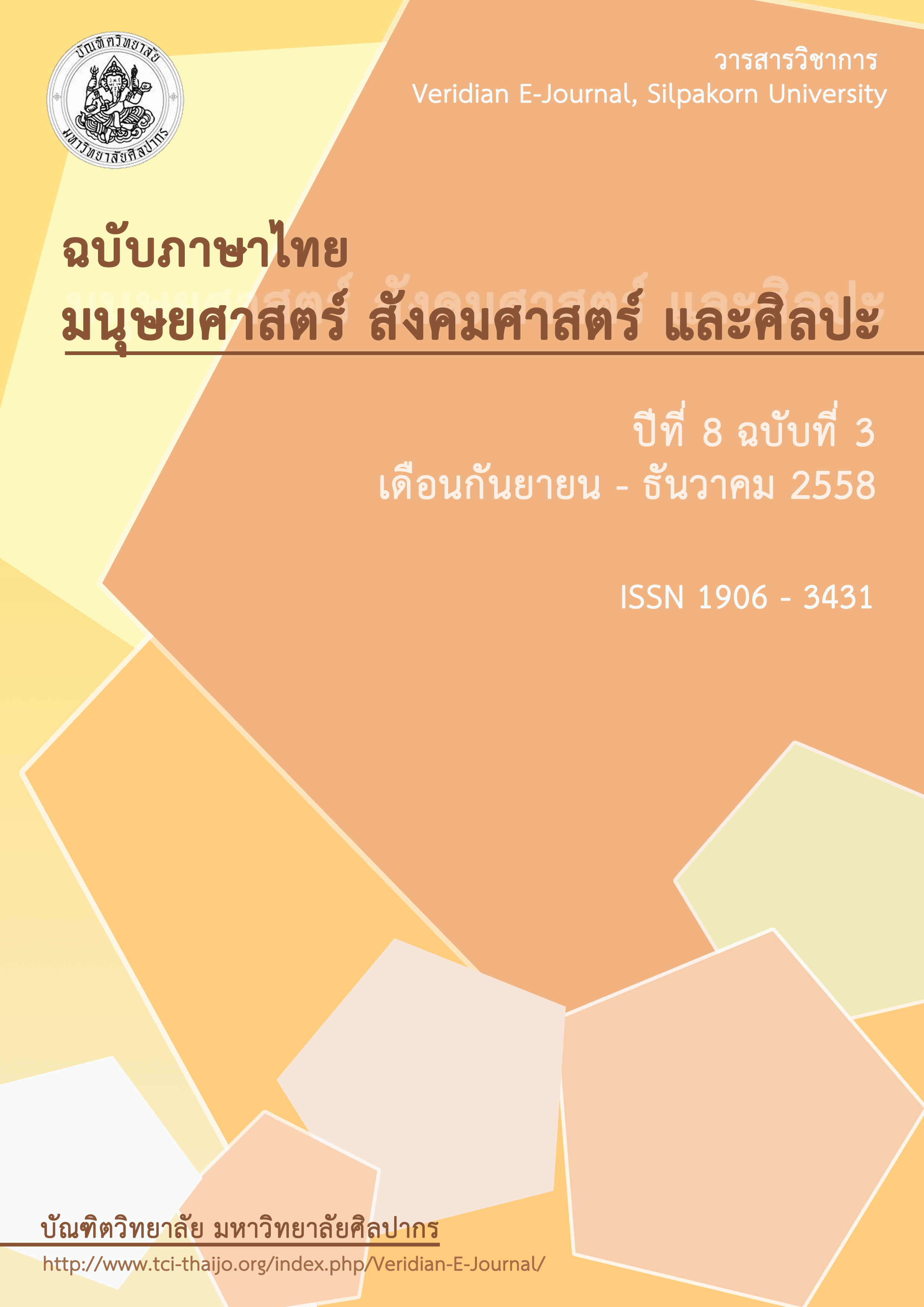การประเมินโครงการพัฒนานักบริหารระดับสูง กระทรวงศึกษาธิการ (นบส.ศธ.) รุ่นที่ 3
Main Article Content
Abstract
บทคัดย่อ
การวิจัยครั้งนี้มีวัตถุประสงค์ 1) เพื่อประเมินบริบท ปัจจัยนำเข้า กระบวนการดำเนินงาน ผลผลิต ของโครงการพัฒนานักบริหารระดับสูง กระทรวงศึกษาธิการ (นบส.ศธ.) รุ่นที่ 3 2) เพื่อศึกษาแนวทางการพัฒนาโครงการพัฒนานักบริหารระดับสูง กระทรวงศึกษาธิการ (นบส.ศธ.) รุ่นที่ 3 ประชากรที่ใช้ในการวิจัย ได้แก่ ผู้บริหารหน่วยพัฒนา จำนวน 3 คน หัวหน้ากลุ่มพัฒนาผู้นำ จำนวน 1 คน ผู้เข้ารับการพัฒนา จำนวน 94 คน วิทยากรที่ปรึกษา จำนวน 12 คน ผู้รับผิดชอบโครงการ จำนวน 8 คน รวมทั้งสิ้น 118 คน เครื่องมือที่ใช้ในการวิจัย ได้แก่ แบบสอบถาม จำนวน 94 ชุด วิเคราะห์ข้อมูลโดยใช้ค่าความถี่ (Frequency) ค่าร้อยละ (Percentage) ค่าเฉลี่ย (μ) และส่วนเบี่ยงเบนมาตรฐาน (s) แบบข้อมูลการสัมภาษณ์และประเด็นการสนทนากลุ่ม วิเคราะห์ข้อมูลโดยการวิเคราะห์เนื้อหา (Content Analysis)
ผลการวิจัย พบว่า
1. การประเมินบริบทปัจจัยนำเข้ากระบวนการดำเนินงาน ผลผลิต ของโครงการพัฒนานักบริหารการศึกษาระดับสูง กระทรวงศึกษาธิการ (นบส.ศธ.) รุ่นที่ 3 รายละเอียด ดังนี้
1.1 การประเมินด้านบริบท พบว่า ผู้เข้ารับการพัฒนา มีความคิดเห็นอยู่ในระดับมากที่สุด โดยมีค่าเฉลี่ยเท่ากับ 4.65 เมื่อพิจารณาเป็นรายข้อ พบว่าผู้เข้ารับการพัฒนามีความคิดเห็นว่าวัตถุประสงค์ของโครงการพัฒนาสอดคล้องกับนโยบายการพัฒนาของกระทรวงศึกษาธิการมีค่าเฉลี่ยมากที่สุด โดยมีค่าเฉลี่ยเท่ากับ 4.76
1.2 การประเมินด้านปัจจัยนำเข้า พบว่า ผู้เข้ารับการพัฒนามีความคิดเห็นอยู่ในระดับมาก โดยมีค่าเฉลี่ยเท่ากับ 4.44 เมื่อพิจารณาเป็นรายข้อ พบว่าผู้เข้ารับการพัฒนามีความคิดเห็นว่า วิทยากรในโครงการเป็นผู้มีความรู้ ความสามารถ มีค่าเฉลี่ยมากที่สุด โดยมีค่าเฉลี่ยเท่ากับ 4.74
1.3 การประเมินด้านกระบวนการ พบว่า ผู้เข้ารับการพัฒนามีความคิดเห็นอยู่ในระดับมาก โดยมีค่าเฉลี่ยเท่ากับ 4.40 เมื่อพิจารณาเป็นรายข้อ พบว่า ผู้เข้ารับการพัฒนามีความคิดเห็นว่า ความเอาใจใส่ดูแล การให้คำปรึกษา แนะนำของวิทยากรที่ปรึกษาและผู้รับผิดชอบโครงการ และบุคลิกภาพของวิทยากรมีความเหมาะสมโดยมีค่าเฉลี่ยมากที่สุด 4.71
1.4 การประเมินด้านผลผลิต พบว่า ผู้เข้ารับการพัฒนามีความคิดเห็นอยู่ในระดับมากที่สุดมีค่าเฉลี่ยเท่ากับ 4.63 เมื่อพิจารณาเป็นรายข้อ พบว่าผู้เข้ารับการพัฒนามีความคิดเห็นว่า ผู้เข้ารับการพัฒนาบริหารงานโดยคำนึงถึงประโยชน์ของส่วนรวมมากกว่าประโยชน์ส่วนตน โดยมีค่าเฉลี่ยเท่ากับ 4.83
2. แนวทางการพัฒนาโครงการพัฒนานักบริหารระดับสูง กระทรวงศึกษาธิการ (นบส.ศธ.) รุ่นที่ 3 รายละเอียด ดังนี้
2.1 ควรกำหนดช่วงเวลาในการพัฒนาให้มีความต่อเนื่องกันตลอดระยะเวลาของหลักสูตร
2.2 จัดเตรียม สื่อ อุปกรณ์ ให้มีความเพียงพอ สำหรับอำนวยความสะดวกในการใช้งานและสืบค้นข้อมูล
2.3 ปรับสัดส่วนกิจกรรมการพัฒนา โดยมุ่งเน้นการแลกเปลี่ยนเรียนรู้
Abstract.
The research aims to 1) evaluate context, input factors, implementation processes and outputs of the Development Project for Chief Executive Officers of Ministry of Education, Class 3 2) Study the ways for development of the Development Project for Chief Executive Officers of Ministry of Education, Class 3. The data were collected from 118 participants consisting of 3 executive officers in the development sectors, the head of the leadership development division from of the National Institute for the Development of Teachers, Faculty and Staff and Education Personnel (NIDTEP), 94 participations of the Development Project for Chief Executive Officers of Ministry of Education, Class 3, 12 instructors, 8 project managers. The research instruments for data collection were 94 questionnaires; the data were analyzed by using various statistical tests: frequency, percentage, mean (μ), and standard deviation (s)..Furthermore, one set of interview questions for personal interviews and one set of interview questions for group discussion were used and the data were analyzed through the content analysis method.
The Research Findings:
1. The evaluation of context, input factors, implementation processes and outputs of the Development Project for Chief Executive Officers of Ministry of Education, Class 3, details as follows:
1.1 In terms of the evaluation of context, the participants of the Development Project for Chief Executive Officers of Ministry of Education rated their opinions at the highest level (μ = 4.65). When focusing on each item, the highest average scores (μ = 4.76) derived from the item related to the consistency of the aims of the project with the development policy of the Ministry of Education.
1.2 In terms of the evaluation of input factors, the participants of the Development Project for Chief Executive Officers of Ministry of Education rated their opinions at the high level (μ = 4.44). When focusing on each item, the highest average scores (μ = 4.74) derived from the item that the instructors were knowledgeable and talented.
1.3 In terms of the evaluation of implementation processes, the participants of the Development Project for Chief Executive Officers of Ministry of Education rated their opinions at the high level (μ = 4.40). When focusing on each item, the highest average scores (μ = 4.71) derived from the item that the instructors and project managers advised and took care of the participants as well as the personalities of the instructors are suitable.
1.4 In terms of the evaluation of outputs, the participants of the Development Project for Chief Executive Officers of Ministry of Education rated their opinions at the highest level (μ = 4.63). When focusing on each item, the highest average scores (μ = 4.83) derived from the item that the participants put more emphasis on common interest than personal interest.
2. The ways for develop of the Project evaluation for Chief Executive Officers of Ministry of Education, Class 3, details as follows:
2.1 The duration of time for the development should be constant throughout the project.
2.2 Media and instruments for training should be provided adequately in order to facilitate the participants in working and searching information.
2.3 Adjusting the methods of training by focusing on knowledge exchange.

